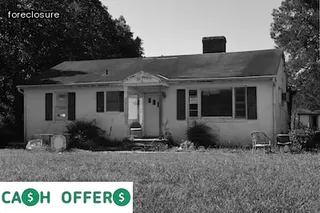Oregon foreclosure laws state that mortgage lenders must follow all steps to secure a homeowner's property before filing for foreclosure. The process typically starts with the lender sending a notice of default, which is an official document requiring the homeowner to pay off any overdue loan payments.
If the loan payments are not made within a certain period of time, the lender will file for foreclosure and proceed with taking ownership of the home. To avoid losing your house, keep up with your loan payments and contact your mortgage lender as soon as possible if you fall behind.
Additionally, consider applying for forbearance or loan modification if you cannot make full payments due to financial hardship. Finally, there are many organizations in Oregon offering free counseling services to help homeowners facing foreclosure stay in their homes.

Foreclosure is a legal process in which a lender reclaims a borrower's property when they are unable to keep up with their mortgage payments. When the homeowner fails to pay their mortgage, the lender has the right to issue a Notice of Default (NOD), which is an official document initiating the foreclosure proceedings.
A Notice of Sale (NOS) will then be issued, and if no one buys the property at auction, then it becomes bank-owned or repossessed by the lender. The foreclosure process can take several months, depending on each individual state's laws and regulations, including those in Oregon.
It’s important for homeowners to be aware of what constitutes a foreclosure and how to avoid it by staying on top of their mortgage payments and communicating with their lenders if they have any difficulty doing so.
In Oregon, the preforeclosure process begins when the mortgagor has missed two or more payments and the lender has notified them of their delinquency. The homeowner then has a period of time to make up the missed payments before foreclosure proceedings begin.
During this time, homeowners have the right to reach out to their lenders to work out an agreement that could include loan modification, repayment plans, or forbearance. If an agreement is not reached during this preforeclosure period, a public notice is issued and foreclosure proceedings are initiated.
This can be done through either judicial or non-judicial foreclosure. Judicial foreclosure requires court involvement while non-judicial does not and is much faster but less common in Oregon.
Homeowners should take advantage of available resources such as counseling from nonprofit organizations or legal advice from lawyers to get informed about their rights and options during this preforeclosure period in order to avoid losing their property through foreclosure.

The preforeclosure process in Oregon can be daunting, but there are resources and assistance available to help homeowners navigate the process. Understanding the foreclosure laws in Oregon is key to understanding the options a homeowner has to prevent their home from being taken away.
There are government-sponsored programs such as Homeownership Preservation Foundation’s 888-995-HOPE hotline which provides free foreclosure prevention counseling and assistance. Other organizations, such as the U.
Department of Housing and Urban Development (HUD) provide housing counselors who can help advise homeowners on how to avoid foreclosure. Additionally, legal aid services are sometimes available for those who qualify financially and are facing foreclosure proceedings.
To understand the full range of options available, it’s important to work with an experienced attorney familiar with Oregon’s foreclosure laws who can offer knowledgeable advice about how best to proceed with a preforeclosure situation in order to keep your home safe from repossession or sale.
As an Oregon homeowner, it is important to understand your rights and responsibilities during the preforeclosure period. You may be eligible to receive a notice of default from your lender prior to the foreclosure process starting.
This gives you the opportunity to explore options such as loan modification or repayment plans with your lender before they take action on a foreclosure. Additionally, it is important to know that Oregon state law requires lenders to consider any reasonable offers for repayment before beginning foreclosure proceedings.
If you are unable to come up with an agreement with your lender, you should consult a qualified attorney or housing counselor for advice on how you can protect yourself from losing your home. Additionally, understanding the timeline of events during the preforeclosure period will provide you with knowledge of when certain actions may be taken and what steps need to be taken in order for you to avoid foreclosure and keep your house.

When a homeowner in Oregon fails to make their mortgage payments, the lender may file a notice of default after three consecutive missed payments. This starts the foreclosure process, giving the homeowner 90 days to pay what they owe or come to an agreement with the lender on a payment plan.
If neither of these options are pursued, the lender will proceed with a trustee sale or judicial foreclosure. The trustee sale is quicker and more cost effective for lenders, and it involves selling the property at auction to the highest bidder.
The judicial foreclosure process requires court approval and oversight, which gives homeowners more opportunities to challenge the foreclosure in court and potentially save their home from being sold. Homeowners must keep up with their mortgage payments or work out an arrangement with their lender if they want to stay in their home.
In Oregon, the foreclosure process begins when a homeowner defaults on their mortgage payments. Once a homeowner is delinquent in payments, their lender will contact them to discuss their options.
If the homeowner fails to make attempts to catch up or agree to an arrangement, the lender may then initiate formal foreclosure proceedings. The lender can do this by filing a complaint with the court and sending a notice of default to the homeowner.
This notice serves as public notice that the homeowner is in default on their mortgage and will begin foreclosure proceedings if they cannot catch up on payments or reach an agreement with their lender. The notice also indicates how much time the homeowner has to respond before legal action is taken.
It is important for homeowners who are facing foreclosure understand all of their options so they can come up with a plan that works for them and hopefully keep their home.

Foreclosure is a process that can be difficult to navigate, particularly in Oregon. Under Oregon law, if a borrower defaults on the loan they took out to purchase the property, the lender has the right to initiate foreclosure proceedings.
The first step in this process is for the lender to file a Notice of Default with the county clerk's office, which informs borrowers that their loan is in default and provides them with an opportunity to cure their debt before foreclosure proceedings begin. After this notice has been filed, lenders are typically required by law to provide an additional notice informing borrowers of their rights and options under state law.
If these notices are not responded to or cured within the allotted time period, then the lender may proceed with a foreclosure sale. Fortunately, there are measures homeowners can take to avoid losing their home due to foreclosure.
Homeowners should contact their lender as soon as possible if they find themselves unable to make payments on time in order to work out payment plans or other arrangements that may help them keep their home. Additionally, homeowners can also seek assistance from government agencies or housing counseling services that offer advice and assistance throughout the entire foreclosure process.
In Oregon, foreclosures are generally handled through a judicial process. After a borrower has failed to make their mortgage payments, the lender can file a lawsuit in court, asking for the repayment of the loan and possession of the property.
The foreclosure process will then begin by serving a notice to the homeowner that outlines the amount owed and gives them an opportunity to cure or pay off their debt. If there is no response from the homeowner, the lender can move forward with a sale of the property.
A public auction is held with interested buyers bidding on the property, and if no bids are received or accepted, it will revert back to the lender for sale at fair market value. It is important for homeowners to understand their rights during foreclosure proceedings and be aware of any potential options that may help them avoid losing their home.

In Oregon, foreclosures are regulated by state law and the laws vary depending on the type of loan. Generally, lenders must provide at least 90 days notice before initiating foreclosure proceedings.
During this period, homeowners have an opportunity to catch up on past due payments or take advantage of loss mitigation opportunities such as loan modifications or repayment plans. After the 90 day pre-foreclosure period has passed, a lender may file a Notice of Default and obtain a court order to proceed with the foreclosure sale.
Under Oregon law, most foreclosures occur through non-judicial proceedings which can be completed in a few months time compared to judicial foreclosures that take much longer. To avoid losing their home to foreclosure, homeowners should contact their lender as soon as possible if they anticipate having difficulty making payments.
The lender may be able to work out an agreement that allows for missed payments to be made over time or even provide a loan modification that reduces monthly payments. Additionally, local nonprofit organizations such as legal aid clinics and housing counseling services may be able to assist homeowners in understanding their options and finding solutions to prevent foreclosure.
Oregon foreclosure laws are designed to protect homeowners from losing their homes, but it is still important for homeowners to take proactive steps to avoid foreclosure. It is beneficial to understand the foreclosure process in Oregon so that you can make informed decisions about your mortgage and financial situation.
The first step is to communicate with your lender as soon as you realize that you will have difficulty making a payment. You may be eligible for a loan modification or other assistance programs if you can demonstrate a genuine financial hardship.
Furthermore, it is important to stay up-to-date on all payments while exploring other options. If possible, contact a housing counselor or lawyer who can help you navigate Oregon’s foreclosure laws and provide advice on how best to protect your home.
Additionally, consider refinancing the loan or selling the property if the situation becomes too difficult to handle. Taking these steps early on can help ensure that Oregon’s foreclosure laws work in your favor and allow you to keep your home.

If you are facing foreclosure in Oregon, it is important to understand the state's laws and your options for avoiding losing your home. There are several alternatives that may be available to you in order to keep your home, such as loan modification, short sale and deed-in-lieu of foreclosure.
Loan modification involves working with your lender to change the terms of your loan, such as reducing the interest rate or extending the repayment period. A short sale allows you to sell your home for less than what you owe on the mortgage, while a deed-in-lieu of foreclosure means signing ownership over to the lender voluntarily as an alternative to foreclosure.
You may also qualify for assistance from a program like Home Rescue or Mortgage Help, which provide funds or other assistance that can help you avoid losing your home. Additionally, if you have an FHA loan , there are certain protections in place that will help prevent foreclosure.
Through these various options and programs, Oregon homeowners can find ways to keep their homes and avoid foreclosure.
Foreclosure is a tough decision that homeowners in Oregon must make when they are unable to afford their mortgage payments. Each situation is unique and it’s important to understand the pros and cons of allowing your property to go into foreclosure before making a decision.
The primary benefit of allowing your house to go into foreclosure is that you will be relieved of all financial responsibility for the home, including back payments and any fees associated with the foreclosure process. On the other hand, this decision could have negative consequences on your credit score, which can impact your ability to get approved for a loan in the future.
In some cases, you may also be responsible for repaying any money owed after selling the home during auction. Additionally, it can take years for your credit score to recover from a foreclosure, making it difficult to purchase another home or obtain other desirable loans in the meantime.
It’s important to evaluate your financial situation carefully before deciding whether or not you should allow your property to go into foreclosure so that you can make an informed decision that’s right for you.

The financial implications of a defaulted loan or mortgage can be devastating. Not only is there the possibility of losing your home through foreclosure, but also the costs associated with the process, including legal fees.
In Oregon, the foreclosure process can take anywhere from 90 days to about a year before the foreclosure sale occurs. The homeowner will be responsible for all legal fees and other costs associated with the foreclosure.
To avoid going into foreclosure, homeowners should stay current on their payments, contact their lender if they become delinquent on their mortgage payment, and consider refinancing or modifying their loan to make it more affordable. Additionally, homeowners should research their options by talking to a lawyer or HUD-approved housing counselor who can provide advice on how to keep your home during a difficult financial situation.
With early intervention and proper planning, homeowners have a much greater chance of avoiding foreclosure in Oregon and keeping their homes.
It is important for Oregon homeowners facing foreclosure to understand their options and the timeline of the process. A breach letter is generally sent to the homeowner by the lender when they have defaulted on a loan.
The letter informs the borrower that they are in breach of their loan agreement and must either cure or pay off their debt within a certain period of time. To minimize potential losses during foreclosure, it is important to understand what action needs to be taken upon receipt of this letter.
Generally, borrowers should immediately contact their lender, seek legal advice, and consider all available options including loan modification or refinancing before allowing the foreclosure process to continue. Additionally, some lenders may offer an alternative payment plan such as a forbearance agreement if circumstances warrant it.
Homeowners can also consult with a credit counselor for guidance on budgeting and money management strategies which could help in avoiding future financial difficulties. Understanding all possible avenues of assistance can help avoid further actions from the lender and provide additional time for homeowners to pursue financial remedies that may stop or delay foreclosure proceedings.

Navigating the legal system during a foreclosure case in Oregon can be daunting. Knowing what to do and how to navigate the process is key to ensuring that you don’t lose your home.
One of the best ways to ensure that this doesn’t happen is by seeking professional help. A lawyer experienced in Oregon foreclosure laws can provide invaluable assistance in understanding the specifics of your case, as well as helping you find potential solutions.
An attorney can also provide much-needed guidance on dealing with any other parties involved in the foreclosure, such as banks or loan servicers. Additionally, an attorney may be able to negotiate with them on your behalf, which could potentially save you from losing your home altogether.
While there may be upfront costs associated with hiring an attorney, it could be well worth it for the advice and support they provide.
When people let their house go into foreclosure in Oregon, it's often because they have fallen behind on their mortgage payments due to financial hardship or unexpected expenses. Foreclosure is a legal process that can be initiated by the lender if a homeowner has not made the agreed-upon payments.
When this happens, the home can be sold at auction and the proceeds used to pay off the loan. There are many reasons why people may find themselves unable to keep up with mortgage payments and facing foreclosure, including job loss, medical bills, divorce, or other life events that put them in a difficult financial situation.
In some cases, homeowners may not even be aware of all their options for avoiding foreclosure until it is too late. It is important for Oregon homeowners to understand their rights and obligations under Oregon law so they can take appropriate steps before it’s too late and avoid losing their home to foreclosure.

In Oregon, it can take as little as 45 days for a lender to foreclose on a homeowner who has defaulted on their mortgage. The foreclosure process starts when the lender records a Notice of Default and Election to Sell with the county clerk.
This document gives the homeowner 90 days to catch up on their payments before the property is sold at auction. If the homeowner is unable to do so, they will be given 14 days notice prior to the date of sale and will lose their rights in the property.
To avoid foreclosure in Oregon, homeowners should contact their lender and work out an affordable repayment plan or loan modification before they miss any payments.
In Oregon, foreclosure is a legal process that occurs when a homeowner fails to make payments on their mortgage. Foreclosure proceedings are initiated by the lender and begin with a Notice of Default.
The lender must then file a complaint in court to gain legal title to the property. Once the complaint is filed, the homeowner has 90 days to cure the default or pay off the loan in full.
If neither of these options are possible, the home will be sold at public auction and the proceeds of sale will be used to pay off the loan balance plus any additional fees and costs associated with the foreclosure process. If there is any remaining balance after payment of all expenses, it will be paid to the homeowner.
To avoid losing your house through foreclosure, homeowners should work closely with their lender to try and negotiate a payment plan they can afford or pursue other alternatives such as loan modification or refinancing. Additionally, homeowners should also consider consulting with a qualified attorney who can provide them with legal advice regarding their specific situation.
Oregon is one of the few states that allows homeowners facing foreclosure a right of redemption. Specifically, Oregon has a non-judicial foreclosure process which includes a period of redemption where the homeowner may be able to buy back their home if they are able to make good on the overdue debt.
To exercise this right, borrowers must pay off the entire amount due within 90 days after the foreclosure sale. If successful, the borrower can regain their property and avoid losing their house.
This is an important consideration for Oregon residents who are at risk of foreclosure and seeking ways to protect their home from being lost. It is essential for Oregon homeowners to understand their rights under state law and what options they have when it comes to avoiding foreclosure and retaining ownership of their home.